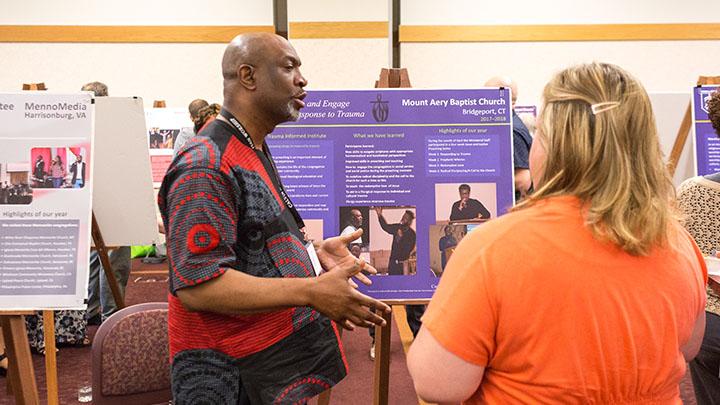Grant program dedicated to revitalizing worship across borders

A growing multitude of lively conversations rapidly drowned out the live jazz music as a crowd of clergy, academics, and community members poured into Prince Conference Center’s Great Hall.
The topic of discussion? How to revitalize Christian worship across congregational, denominational, racial, and generational lines. Seeking to answer this question, the Calvin Institute of Christian Worship (CICW) operates the Vital Worship Grants Program, which annually provides grants of $6,000 to $18,000 to a range of organizations for the implementation of projects aimed at improving worship.
The evening gathering was a poster session showcasing the 2017 grant recipients’ projects, held to both inform the 2018 grant recipients’ project planning and to encourage others to apply in the future. It was part of a three-day colloquium which represented the end of the previous year’s grant projects and kicked off the 2018 grant recipients’ projects.
Formational worship across borders
“The goal is that everybody’s public worship would be revitalized,” said Kathy Smith, the associate director of the institute and the program manager for the grant program, “[that it] would become more formational for the people there, and more honoring of the triune God who’s present in worship.”
To that end, Smith said, “the [program] is very ecumenical,” with more than 20 denominations represented among the 2017 grant recipients. “It enriches all of us,” she added, and explained that the colloquium includes varied worship services modeled after both Protestant and Catholic worship. “We try to make everybody comfortable sometimes, knowing everybody will be uncomfortable sometimes,” Smith said, “but that’s part of our learning, that’s part of the whole idea of vitality in worship.”
Diverse expressions of faith
At the poster presentation, there was dramatic diversity in both institutions and grant projects: churches, seminaries, universities, high schools, nonprofits, retreat centers, and a prison ministry were all represented. Projects ranged from Fredericktown United Methodist’s work on making worship accessible to people with disabilities to Carey Theological College’s work strengthening intergenerational worship in multilingual Chinese-Canadian churches.
“The beauty of our worship is dependent on our liturgical artistry,” said Christine Salzman, a presenter for Saint Philothea Greek Orthodox church of Watkinsville, Georgia. She noted the intergenerational problems facing Orthodox worship in the United States, adding “young people need to take up their place at the chanter’s stand.”
To address this issue, Saint Philothea used their grant to operate a liturgical arts training program with workshops on chanting and iconography for both their congregation and other American Orthodox churches.
Mount Aery Baptist Church, of Bridgeport, Connecticut, used their grant to train clergy how to respond to trauma from a biblical perspective.
“Through the [grant project’s training], preachers better understand how God is still in control,” said Nancy Kingwood, an associate pastor at Mount Aery. She added that the training was intended to help answer “how do we respond when God moves through us?”
“Church is a place to come to both find fulfillment and gain instruction” said Kingwood, “instruction in dismantling unjust systems and how to minister to the least, the last, and the left out.”






